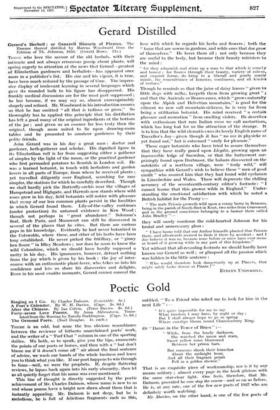Gerard Distilled
Gerard's'lierhall : or Generall Historie of Plantes. The Essence thereof distilled by Marcus Woodward from the Edition of Th. Johnson; 1636.- (Gerald Howe. 21s.)
Timm.: who love the savour of the old herbals, with their intimate and not always erroneous gossip about plants, will spring eagerly to attention at the news that Gerard—greatest of Elizabethan -gardeners and herbalists—has appeared once more in a publisher's list: His size and his vigour, it is true, have been much reduced by the passage of time. The impres- sive display of irrelevant learning in several languages which gave its rounded bulk to his figure has disappeared. His frankly medical discussions are for the most part suppressed ; he has become, if we may say so, almost unrecognizably shapely and refined. Mr. Woodward in his introduction assures us that he has omitted " all that is tedious or gross." So thoroughly has he applied this principle that his distillation has left a good many of the original ingredients at the bottom of the jar ; and given us an essence far less tasty than the original, though more suited to lie upon - drawing-room tables and be presented to amateur gardeners by their polite friends.
John Gerard was in his day a great man : doctor and gardener, herb-gatherer and scholar. His dignified figure in its Elizabethan ruff is far from suggesting either a gatherer of simples by the light of the moon, or the practical gardener who first -persuaded potatoes to. flourish in London soil. He was a learned botanist, in touch with herbalists and garden lovers in all parts of Europe, from whom he received plants ; yet travelled diligently over England, searching for rare simples, the stations for which he carefully described. Though we shall hardly pick the Butterfly-orehis near the villages of Hampstead and Highgate, and Harrods now stands where wild roses grew in his day, field -botanists will 'notice with pleasure that many of our less common plants persist in the localities in which Gerard found them. Lily-of-the-valley continues (under protection) its untamed existence in Ken Wood ; though not perhaps in " great- abundance." Solomon's Seal, Herb Paris, and Moonwort can still be discovered in several of the places that he cites. But there are curious gaps in his knowledge. Evidently he had never botanized in the Cotswolds, where these, and other of his herbs have been long established. He never picked the fritillary, or " ginny hen floure " in Utley Meadows ; nor does he seem to know the wild Columbine, which we should have hardly supposed a rarity in his day. His ignorances, however, detract nothing from the joy which is given by his book : the joy of inter- course with an enthusiastic plant-lover, who takes us into his confidence and lets its share his discoveries and delights. Even in his most erudite moments, Gerard cannot conceal the love with which he regards his herbs and flowers ; both the " tame that are sowne in gardens, and wilde ones that doe grow of themselves." He loves them all ; not only because they
are useful to the body, but because their beauty ministers to the mind :
" for they admonish and stirre up a man to that which is comely and honest ; for floures through their beauty, variety of colour, and exquisit forme, do bring to a liberal, and gentle manly minds, the rremembrance of honestie, comlinesse, and all k indea of vertues."
Though he reminds us that the juice of daisy leaves " given to little dogs with milks, keepeth them from growing great " ; and that the Auricula or Beares-eares, which "grows naturally upon the Alpish and Helvetian mountains," is good for the ailment we now call mountain-sickness, he is very far from being a utilitarian botanist. His mind received " a certain pleasure and recreation " from smelling violets. He describes with enthusiasm that rare Indian cress we call nasturtium, which has long lost for us the attraction of the strange. It is to him that the wild clematis owes its lovely English name of Traveller's Joy—given though it has " no use in physicke as yet found out," but is esteemed " only for pleasure."
Those eager botanists whO have tried to assure themselves that they have really gazed upon Lloydia, growing upon an inaccessible ledge of Snowdon, or that the butterwort sur- prisingly found upon Dartmoor, the balsam discovered on the outskirts of a northern village, were " truly wild," will sympathize with Gerard's wish to believe those " men of good credit " who assured him that they had found wild cyclamen in Lincolnshire and Wales. These will deprecate the chilling accuracy of the seventeenth-century editor's footnote: " I cannot learnt that this growes wilde in England." Under- standing the emotional satisfaction with which he noted a British habitat for the Peony The male Peionie groweth wild upon a conny berry in Betsome, being in the parish of South-fleet in Kent, two miles from Gravesend, and in the ground sometimes belonging to a farmer there called John Bradley "- they will surely condenm the cold-hearted Johnson for his brutal and unnecessary gloss : " I have beene told that our Author himselfe planted that Peionie there, and afterwards seemed to finde it there by accident : and I doe beleeve it was so, because none before or since have over seene or heard of it growing wilde in any part of this kingdome."
Yet without that all-revealing footnote we should hardly have known our Gerard so well ; or glimpsed all the passion which was hidden in the little sentence :
EVELYN UNDERHILL.


































































 Previous page
Previous page